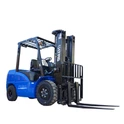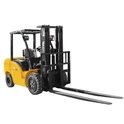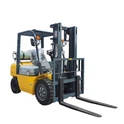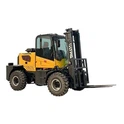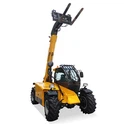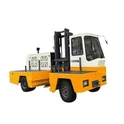
In the industrial sector, diesel forklifts are indispensable tools due to their robustness and reliability. While they are primarily used outdoors due to their high power and ease of refueling, there are still concerns about their suitability for use in warehouses, and the LTMG Team will lead a discussion on the feasibility of using diesel forklifts in warehouses, with a focus on the associated safety issues ranging from improving operational efficiency to complying with health and safety regulations such as OSHA guidelines.

Understanding Diesel Forklifts
Diesel forklifts, similar to small trucks, play a key role in warehouses and industrial areas with their powerful features. They are equipped with front forks that are capable of lifting and moving heavy loads and use the same diesel fuel as trucks. Toyota diesel forklifts, for example, are known for their ruggedness and reliability, making them ideal for a variety of tough work tasks.
The exhaust gases emitted from diesel forklifts during operation contain common gases such as nitrogen and oxygen and harmful substances such as carbon monoxide, as well as tiny particles that may adhere to the lungs. These exhaust fumes not only briefly cause coughing or eye irritation, but long-term exposure may also cause heart disease and breathing problems. Therefore, when using diesel forklifts indoors, it is important to follow strict safety regulations such as OSHA to ensure clean air and maintain health and safety.

Health and safety issues:
Diesel forklifts emit exhaust fumes during operation, and these exhaust fumes contain hazardous substances, such as carbon monoxide and tiny particulate matter, which are harmful to human health. Prolonged exposure to these exhaust fumes can lead to serious health problems such as heart disease and breathing problems.
Precautions for use in the warehouse:
Ventilation: Ensure good air circulation in the warehouse to prevent the accumulation of harmful fumes.
Regular maintenance: Inspect forklifts frequently, especially the exhaust system, to control emissions.
Operator training: Educate forklift operators on the unique challenges of using diesel forklifts indoors, including understanding the risks and responding to emergencies.

Monitoring and Compliance: Use a system to monitor emissions to ensure compliance with safety regulations and check for adjustments regularly.
Alternatives: Consider using electric forklifts indoors, which are less hazardous to the air and a safer option.
Install toxic gas sensors: Install CO and NOx sensors to monitor concentrations of toxic gases and trigger alarms when unsafe thresholds are reached.
Regulatory Compliance: Understanding and complying with relevant health and safety regulations, such as OSHA guidelines, is key to ensuring that diesel forklifts are safe for indoor use.
Conclusion:
While diesel forklifts are typically used outdoors, they can also be used indoors by taking the proper safety measures.Once again, the LTMG Team reminds that the key to using diesel forklifts in warehouses is to make sure the air is clean, to know and follow the safety rules, and to educate the team on how to stay safe. Overall, using diesel forklifts indoors requires special attention to health and safety issues, and the associated risks can be reduced through proper ventilation, maintenance, training and monitoring. Meanwhile, LTMG Team suggests electric forklifts as a viable alternative for use inside warehouses. LTMG has been manufacturing electric forklifts for over 21 years, and we have the top after-sales service in the industry, so you can feel the professional service and know the quality assurance of LTMG products.


